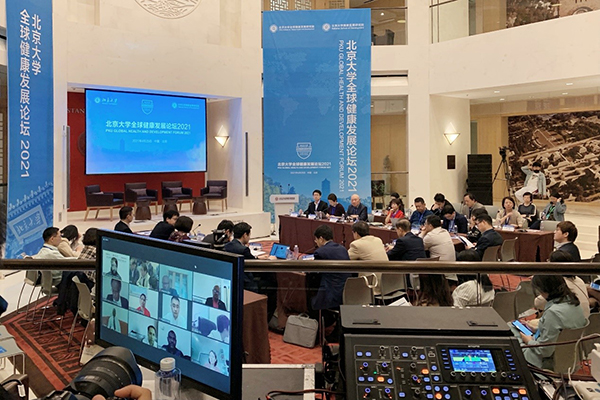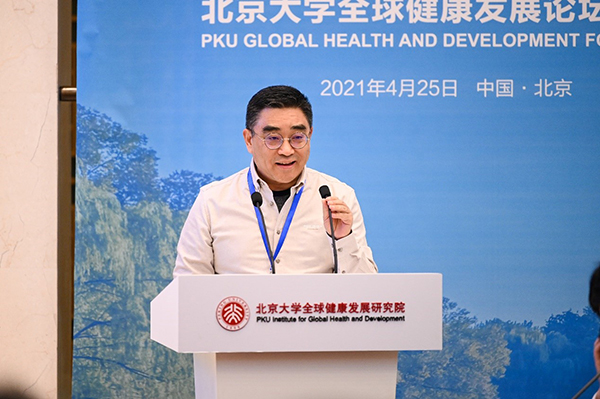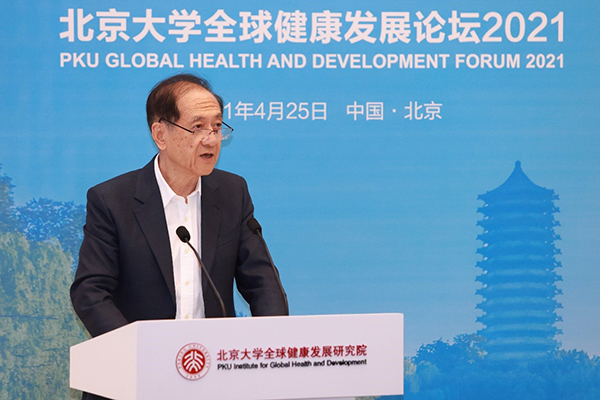
On April 25, 2021,the PKU Global Health and Development Forum 2021 to discuss global health and development, explore new measures for global cooperation against pandemic and share new achievements in digital health and medicine was held at Peking University.
Organized by Peking University Institute for Global Health and Development, the forum brought leaders from the public agencies in developing countries, international NGOs, global health academia, and healthcare industry, and also graduate students from the Peking University Institute of South-South Cooperation and Development together for discussion both online and offline.

Opening remarks Speaking at the beginning of the forum, Prof. Gordon LIU, Dean of Peking University Institute for Global Health and Development, said that the human world had experienced chaos since the outbreak of COVID-19 and we are fortunate enough to be able to conduct much of our activities for normal life, while continuing to cope with the pandemic challenges. However, Prof. Gordon LIU stressed that we still need to address some critical issues in global health in general and the pandemic in particular.

Prof. Gordon LIU
Prof. HAN Qide, the Co-chair of the Advisory Council for the PKU Institute for Global Health and Development, highlighted three points on global health and development issues that are the major topics for today’s forum as well as the central research agenda for the new institute.

Prof. HAN Qide
First, the COVID-19 pandemic has made it clear that the fate of the human race is connected with each other. Collaboration at the global scale is a must for us to fight and win the battle against COVID-19. Virus has no borders. Collaboration has no boundaries.
Second, the pandemic is like an alarm bell, highlighting our awareness of the importance of health and how we need to improve our public health and healthcare system to be better prepared for COVID-19 and other future threats to health.
Finally, development plays an important role in promoting human health in general and fighting against COVID-19 in particular. Since the outbreak of COVID-19, we have witnessed development and innovation on many fronts. Development not only includes how we interact and collaborate with each other, but even how we live, study and work. Digital health is a good example.
Dr. Tedros Adhanom Ghebreyesus, WHO Director-General, stressed that we must address the disparity in access, quality and safe use of digital health technologies in low income and underserved communities. An overarching challenge to digital health is to preserve the privacy, safety and integrity of individual health data. WHO Global Strategy on Digital Health is designed to help countries adopt these 21st century tools as part of their journey towards universal health coverage while strengthening governance and data protection.

Dr. Tedros Adhanom Ghebreyesus
Dr. Peter Sands, Executive Director of Global Fund, said the pandemic has underscored the need for a digital revolution in healthcare delivery and shows how fundamental it is. We need a massive and rampant change in how we manage health information and data aggregation. Countries need not only more funds to build their digital capabilities but also better solutions, more technical support and paths to spend that money well. Dr. Siddharth Chatterje, United Nations Resident Coordinator in China, quoted the words of the ancient Greek philosopher Herophilus, “without health, we don’t have strength, we don’t have intelligence, we don’t have wealth” to emphasis that stronger health systems and universal health coverage must occur to achieve sustainable development.
Dr. Siddharth Chatterje also introduced the ongoing actions in Africa to illustrate how we can harness big data and innovation to leapfrog stronger health system and universal health coverage.
Mr. Steve Davis, Senior China Strategy Advisor and Interim Director for the China Country Office of the Bill & Melinda Gates Foundation, believes that China has an even greater potential for becoming an effective provider of global public goods in the future.
He offered two ideas on how China could leverage its unique position to further its global efforts in supplying affordable quality health products. Frist, to maximize the impact and minimize the cost of global goods, it is necessary that we think holistically about the full journey of these products across the entire value chain from beginning to end, including what activities should be done and what resources must be mobilized in different stages. Second, we must accelerate the drive for affordable, digital public goods and global health.
After the opening remarks, the guests delivered speeches in three sessions. The themes of the three sessions were global cooperation against pandemic, digital health and medicine, and global health governance.
Session 1: Global Cooperation Against Pandemic
Prof. FU Jun, Academic Dean of the PKU Institute of South-South Cooperation and Development, described the 4R model of crisis management: recognition, readiness, response and recovery, and made some comments on China's performance in the battles against COVID-19 and SARS within this framework.
Prof. ZHA Daojiong, Professor of the PKU School of International Studies and Institute of South-South Cooperation and Development, introduced four points to promote fair access for all to Coronavirus vaccines from the perspectives of policy interference, manufacturing capacity, regulatory pre-approval mechanism and public publicity.
Ms. ZHANG Li, Director, Strategic Innovation and New Investors Hub at Gavi, briefly introduced Gavi's mission and its efforts to improve vaccine accessibility in low - and middle-income countries. She believes that the effectiveness and global accessibility of the new vaccine are crucial to the development of the world economy.
Mr. Somil Nagpal, Health Sector Coordinator of the World Bank Jakarta Office, introduced Indonesia's COVAX vaccination plan and the current vaccination situation, and also talked about the measures taken by Indonesia to improve the national accessibility of COVAX.
The moderator of this session is Prof. FU Jun.
Session 2: Digital health and medicine
Prof. ZHANG Luxia, Associate Dean of the National Institute of Health Data Science of PKU, said that the State Council issued a number of new policies related to artificial intelligence to encourage the local government to establish AI application and to pilot AI relevant new policies. In 2018, the definition and standards of medical AI products was firstly included in categories and classification list of medical devices by the National Medical Products Administration, which is a benchmark to indicate the AI medicine has already come from application to commercialization in China. But the effectiveness and validity of health AI products need to be proved by the clinical trials and we need more industry to be interested in that kind of study and to be involved.
Dr. WU Xiaobin, BeiGene Global President & Global Chief Operation Officer, said that very few people realize that China has made great progress in the area of bio-tech in the past few years. So many innovative products are coming up to the market approved, in particular, the biggest contribution for that is coming from local Chinese innovative companies. Next, China’s bio-tech industry will be working together with multinational bio-tech companies to provide patients with more affordable medicine and service.
Ms. OUYANG Qiong, CEO of Hangzhou AIMed Technology, said that as one of the major business communication tools, chat bots uses a massive data analysis of doctor patient online communication to have insights on the real needs, by automatically capturing the real-time information and processing the material to generate up to date medical content and deliver evidence to healthcare professionals. Finally, the intelligent medical reports can empower doctors and educate patients, improve diagnosis accuracy and increase the capabilities of medicine.
Ms. Liz Ashall-Payne, Co-founder and CEO of ORCHA said that digital health applications have emerged in the context of digital medicine, but the application of digital health applications still faces four major obstacles: awareness, accessibility, trust and ongoing governance. Only when these issues are addressed will people and patients truly have access to high-quality digital health tools.
The moderator of this session is Prof. QIN Xuezheng, Associate Dean, of School of Economics at Peking University.
Session 3: Global Health Governance
Prof. ZHENG Zhijie, Associate Dean of PKU Institute for Global Health and Development, talked about the challenges and opportunities faced by global health. He further introduced PKU Global Health Program.
Prof. HAO Yuantao, Dean of Sun Yat-Sen University School of Public Health, introduced applications of digital analysis in epidemic prevention and control through systematic review and meta-analysis, for example measuring basic reproduction number.
Prof. WANG Youfa from Xi’an Jiaotong University Global Health Institute, talked about the serious challenges brought by Non-communicable Chronic Diseases, introduced the critical actions about preventing NCDs and emphasized the importance of international cooperation.
Prof. ZHOU Yongmei, Professor of PKU Institute of South-South Cooperation and Development, stressed that plastics will harm marine life, human health and economy. She further proposed that global actions are required to control plastic emission.
The moderator of this session is Prof. ZHENG Zhijie.
The Forum was held at the Stanford Center of Peking University, with bilingual live broadcasts.